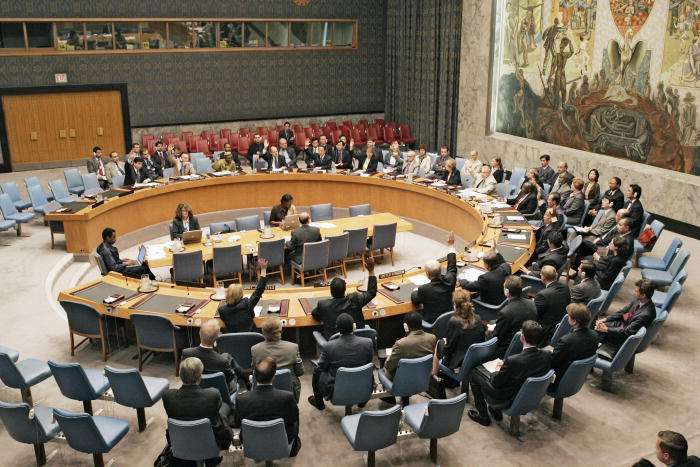 By Otto Spijkers
By Otto Spijkers
The United Nations Security Council has the primary responsibility for maintaining international peace and security (Article 24/25 of the UN Charter). It can decide for itself what constitutes a threat to the peace, breach of the peace, or act of aggression (Article 39). Is climate change such a threat? When the UN Charter was drafted in San Francisco, 1945, some countries suggested that the Charter should define what constitutes a threat or breach of the peace. According to Bolivia, for example, this would be useful "in order that states composing the international community may recognize what they should avoid in their international conduct so as not to give occasion for collective sanctions" (United Nations Conference on International Organization or UNCIO, Docs, vol. 11, p. 578 ). Moreover, a substantial group of countries, headed by the same country (Bolivia), suggested making a definite list of situations when the Security Council had a duty to intervene (UNCIO, vol. 12, p. 341. The following countries supported the suggestion: Bolivia, Colombia, Egypt, Ethiopia, Guatemala, Honduras, Iran, Mexico, New Zealand, and Uruguay.). Many states opposed that idea. They said that any attempt to limit the freedom of the Council would be dangerous, because it could force the Council to act when it would be better not to, and to refrain from acting when a certain form of aggression was not in the list (UNCIO, vol. 12, p. 342. Some of the opposing states: Czechoslovakia, the Netherlands, Norway, Paraguay, South Africa, the UK, and the USA). The Bolivian motion was defeated. And thus the Charter leaves it up to the Council to decide what is a threat to the peace.  Apart from aggression, the Security Council has already labeled apartheid (S/RES/418(1977)), international terrorism (1368(2001)), and the proliferation of weapons of mass destruction (1467(2003)) as a threat to the peace. The Council has also stressed that the HIV/AIDS pandemic, if unchecked, may pose a risk to stability and security (1308(2000)). And perhaps another possible threat will be added to the list: climate change. To convince the skeptics, the current President of the Council (United Kingdom) has circulated a paper:
Apart from aggression, the Security Council has already labeled apartheid (S/RES/418(1977)), international terrorism (1368(2001)), and the proliferation of weapons of mass destruction (1467(2003)) as a threat to the peace. The Council has also stressed that the HIV/AIDS pandemic, if unchecked, may pose a risk to stability and security (1308(2000)). And perhaps another possible threat will be added to the list: climate change. To convince the skeptics, the current President of the Council (United Kingdom) has circulated a paper:
Anticipating that some U.N. member states will argue that climate change should remain a matter for the General Assembly or agencies dealing with environment, Britain circulated a so-called concept paper arguing that climate change could provoke new wars, change borders, disrupt energy supplies and force mass migration. It outlines six areas where climate change could affect global security: border disputes, migration, energy supplies, other resource shortages, societal stress and humanitarian crises. Melting ice and rising sea levels could alter the world’s physical landmass, leading to potential changes in political or maritime borders, and mass migration could also result, with some estimates that up to 200 million people could be displaced by the middle of the century, the paper says.

Yes, I agree. It’s best not to add more things to the list of things to do, when the existing list is already too demanding. It makes the Council, and the United Nations as a whole, seem powerless, and that may be the worst of all.
Given that “border disputes, migration, energy supplies, other resource shortages, societal stress and humanitarian crises” are all reasonable threats to peace and order, but arise independently of Global Climate Change, I think the council would be better off sticking to current crises. I am a little leery of pre-emptive action in general after Iraq. I think the Security Council should adopt a “once removed rule.” If the phenomenon (proliferation, migration, famine) threatens peace and security, then the Council should consider acting. If the phenomenon could cause something that threatens peace and security (election of someone who starts making Hitler like pronouncements, Iran getting richer and so acquiring the potential to develop its nuclear program, technological advances that enable the creation of more powerful weapons of mass destruction ) the council should keep its eyes on the situation (like HIV) but not do anything. They seem to have a hard enough time actually doing anything, so let’s not have them worry about all of the things that, somewhere along the causual chain from the first man who built a pointy stick or started a fire, contribute to the inevitable global armageddon.
-Nick